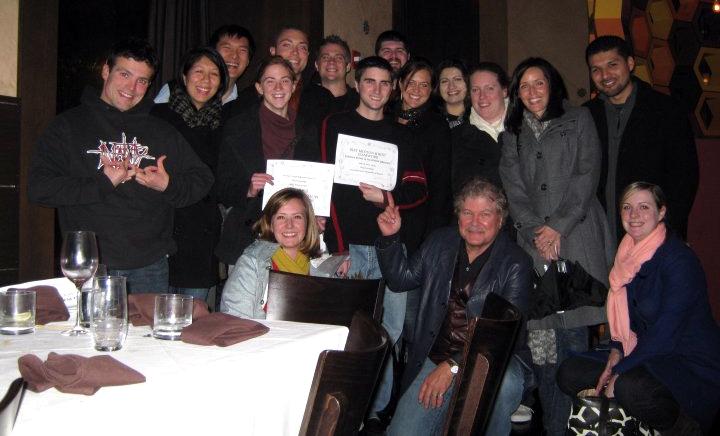Hard work, preparation pays off for UN Simulation class
ModelUN:Ronald Fox?s UN Simulation class recently won Outstanding Delegation at New York?s Model UN conference.:Courtesy photo
May 5, 2010
Sacramento State students in Ronald Fox’s UN Simulation, or Government 138 class, don’t just earn a course grade; they also gain real-life experiences and bring prestigious awards to the university.
Unlike any other course at Sac State, UN Simulation is dedicated to preparing students for the United Nations simulation conferences. In the fall semester, the group attends the American Model UN conference in Chicago; in the spring semester, they attend New York’s National Model UN.
This semester, Sac State’s Model UN delegates won the Outstanding Delegation and Outstanding Position Paper awards for its representation of the Third World Network, a non-governmental organization. Delegations came from more than 30 countries.
“In the last seven years our success has been truly remarkable,” Fox said. “At the American Model UN in Chicago we have won Overall Best Delegation in six of the last seven years.”
Overall Best Delegation is the highest award given at the American Model UN conference. Sac State delegates have won for representing countries such as Colombia, Brazil, Cuba, Venezuela and Mexico.
“When on the American Model UN 2009 Delegation as a representative of Brazil, Sac State was awarded the Outstanding Delegation award,” said senior government major Elizabeth Martinez. “Only four out of over 100 plus university delegations are given this prestigious award.”
Martinez hopes the prestige the award brings to the university will encourage it to keep the program running despite the negative economic climate.
Fox said he was pleased that the last academic year had been exceptionally fruitful.
The conference in New York held every fall isn’t just a competition against other schools in the county. It has increasingly become an international competition, with representatives coming from Japan, China, Germany and others, Fox said.
Fox’s experiences in attending the Model UN conferences and teaching the course has made Sac State a strong competitor, beating out competition from the Ivy League and other prestigious universities.
“There is a lot of pride when your name is called in a job well done. Our name is listed there along with Georgetown, some Ivy League private school, there’s our school listed among them,” Fox said. “Some prestigious universities are condescending to universities like Sac State, and it’s nice to know our best students can compete with theirs and win.”
The UN Simulation course is open to all majors, but is usually taken by students with an interest in international relations.
The program started out as an extracurricular activity in 1977.
“From 1977 to 1992, this class wasn’t taken for credit, so I didn’t get any pay to do it and the students didn’t get any credit, so some didn’t take it seriously,” Fox said.
Fox drafted a proposal to the university to make UN Simulation a credited course, and in 1992 it officially became part of Fox’s course load. The class is offered every fall and spring semesters for credit.
Fox picks students he believes can handle the rigor of preparing for the Model UN conferences and are capable of the excellence required at the conferences.
“Sometimes students come to me because they’ve heard about the program. Sometimes I have to do the recruiting myself by using my own classes and looking to colleagues and getting the names of their top students,” Fox said. “My colleagues know what I look for. Not just GPA.”
The selection of the students is a task he doesn’t take lightly because there are so many factors in picking a strong delegate, Fox said.
“Someone could be Albert Einstein brain-wise, but an ineffective delegate because they’re introverted,” Fox said.
Preparation for the Model UN conferences begins before the start of the semester, Fox said. Fox wrote a 250-word manual that instructs students on how to prepare for the conference. Before the conference, the students already know what country they will be representing and in which committees and caucuses they will participate.
When assigned to these committees, students must speak and negotiate on behalf of the county they are representing. Fox said research is a vital part of the preparation because most of the countries the students will represent are not well-known.
“I prepared by researching the topics for my specific committee and becoming knowledgeable about UN actions and resolutions that related to those topics,” said international relations graduate student Chris Arns.
Arns attended the Model UN conferences in Washington, D.C., and New York City. In preparing for the conferences, Arns researched the countries he’s representing, their history, philosophy and record of participation at the UN conferences.
“Delegates try to get the international community to recognize and act on certain issues that are relevant to their country, and they do so through diplomacy,” Arns said. “The end goal is to pass resolutions, which much be voted on by the entire committee.”
The Model UN experience helped students find their strengths and weaknesses, said graduate international relations student Louis Cathemer, who has been a delegate for the last two years.
“I’ve learned that I’m a good bridge builder between sides that maybe have differences,” Cathemer said. “Some people might be better suited to learning how to effectively counter or fight against other ideas as opposed to building bridges.”
Cathemer said he has seen the hard work Fox has put into the class and knows that it is more than just about winning the awards.
“I can say that Dr. Fox can’t do anything halfway; you might call him a perfectionist. He demands excellence from his students who are capable of it, he picks the students who are capable of producing,” Cathemer said. “Students learn a lot more because he is so demanding. Students respect him for that; I know I certainly do.”
























































































































